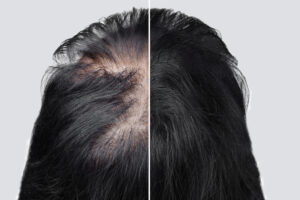 Alopecia Treatment, Stockbridge GA
Alopecia Treatment, Stockbridge GA
Hair loss occurs in circular or irregular patterns in people with alopecia areata. It’s possible that these spots will merge, bringing the problem into sharper focus. When your immune system mistakenly targets your hair follicles, you will experience hair loss. The National Alopecia Areata Foundation estimates that 7 million people in the United States suffer from this type of hair loss (NAAF). In addition to age and gender, it does not discriminate in its ability to strike. Anyone of any age can get alopecia areata, though it most commonly manifests in young adults. Also, it varies from person to person.
The bald patches of alopecia areata can appear anywhere on the body, not only on the scalp. This includes the face, eyebrows, and eyelashes. It may also progress gradually and return years after the initial occurrence. Alopecia Universalis is a disorder characterized by the loss of hair from everywhere on the body. Even if your hair grows back, you may still lose some of it at some point. In some cases, hair may not grow back at all, while in others it may grow back in a relatively short amount of time. Although there is presently no treatment for alopecia areata, it’s important to remember the bright side of the situation. National Alopecia Areata Foundation research suggests that this type of hair loss may not necessarily be permanent. Since hair follicles are themselves still alive, hair loss is sometimes treatable. In addition to these creative concealment options, there are treatments that may promote hair growth and prevent further hair loss. There are additional resources to help you deal with the emotional strain that hair loss can cause.
Dermatology, Treatment for Alopecia
Even though alopecia areata has no known cure, there are therapies that may prevent further hair loss or promote faster hair growth. Because of the condition’s unpredictability, you may need to try a variety of treatments before finding one that helps you. Keep in mind that there is no guarantee that treatment will work. Hair loss may persist despite medical intervention in some patients. Medications designed to promote hair growth can be rubbed into the scalp. There is a wide selection of both OTC and prescription drugs to choose from:
- Minoxidil (Rogaine) has OTC availability, and while it’s commonly used, it is not FDA approved for alopecia areata. Before applying it to areas such as the scalp, eyebrows, and beard, you should speak with a healthcare professional. There’s only evidence that it’s useful for people with limited alopecia areataTrusted Source. It generally takes about 4–6 months, or longer, to see results.
- Anthralin (Dritho-Scalp) is a drug that irritates the skin to spur hair regrowth.
- Corticosteroid creams such as clobetasol (Impoyz), foams, lotions, and ointments are thought to work by decreasing inflammation in the hair follicle.
- Topical immunotherapy is a technique in which a chemical like diphencyprone is applied to the skin to spark an allergic rash. The rash, which resembles poison oak, may induce new hair growth within 6 months. However, though repeat treatment may be necessary, it isn’t ordinarily done indefinitely.
Hair regrowth after steroid injections is a popular treatment for mild, patchy alopecia. Steroid injections are made with very few needles, and they are made directly into the bald spots. In order for hair to grow back, the procedure must be done every 1–2 months. It does little to prevent further hair loss. Although cortisone tablets may be an option for treating your significant alopecia, you should talk to your doctor before taking them. The use of oral immunosuppressants, such as methotrexate and cyclosporine, is another strategy you can pursue. They prevent an immune response and are effective, but long-term usage is not possible because of dangerous side effects such as hypertension, liver and kidney damage, and an increased risk of major infections and malignancies.
Photochemotherapy, in which a light sensitizer is used, and phototherapy, in which particular wavelengths of ultraviolet light are used for their healing benefits, are both forms of light therapy. One of the ways in which laser therapy can promote hair growth is by delivering precisely calibrated levels of radiation. Each treatment option has been shown to be safe and effective. A number of patients with alopecia areata choose for non-conventional treatments. Know that these are all in the testing phase. There is no clinical trial data or other medical/scientific evidence to support their use. Acupuncture, aromatherapy, vitamins (such as zinc and biotin), minerals, oils (such as coconut, tea tree, and castor), onion juice rubbed into the scalp, and probiotics are all examples of natural and alternative remedies. Some research suggests that altering one’s diet may have a beneficial effect.
If you have been diagnosed with an autoimmune disorder, you may want to look into trying an anti-inflammatory diet. The goal of this diet is to lessen the body’s immunological reaction and hence the likelihood of future hair loss episodes. The items included in this eating plan have been shown to reduce inflammation. Blueberries, nuts, seeds, broccoli, beets, and lean meats like wild-caught salmon form the basis of this diet, often known as the autoimmune protocol. More than only lowering inflammation, the consumption of a diet rich in whole grains, fruits, vegetables, and lean meat is advantageous to one’s health.
NHCC- National HealthCare Center, GA; Stockbridge GA Alopecia treatment
Several distinct categories of skin diseases exist. Some have known hereditary causes, whereas others have not. However, nutrition, stress, sunshine, intestinal bacteria (Helicobacter pylori), and other lifestyle variables are common contributors to skin problems like acne and eczema. Consult the knowledgeable dermatologists at the National Healthcare Center for the best medical advice. We’ll zero in on the root of your skin problem and recommend effective solutions.

